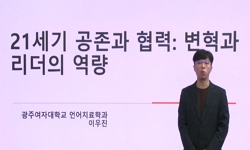This study analyzes the characteristics of the stories of 29 sea-related tales selected from The Comprehensive Collection of Korean Folklore. The purpose of this study is to examine the ecological awareness of the narrative community. Due to the chara...
http://chineseinput.net/에서 pinyin(병음)방식으로 중국어를 변환할 수 있습니다.
변환된 중국어를 복사하여 사용하시면 됩니다.
- 中文 을 입력하시려면 zhongwen을 입력하시고 space를누르시면됩니다.
- 北京 을 입력하시려면 beijing을 입력하시고 space를 누르시면 됩니다.

생태론적 상상력으로 본 바다 관련 설화연구 - 『한국구비문학대계』를 대상으로 = A Study on the Sea-Related Folk tale from Ecological Imagination - focusing on ‘The Comprehensive Collection of Korean Folklore’
한글로보기https://www.riss.kr/link?id=A108381129
-
저자
강지연 (서원대학교)
- 발행기관
- 학술지명
- 권호사항
-
발행연도
2022
-
작성언어
Korean
-
주제어
Sea-Related Folk tale ; Ecology ; Ecological awareness ; Organism ; Monism ; Coexistence ; Symbiosis ; Imagination of Folk tales ; 바다 설화 ; 생태주의 ; 생태 인식 ; 유기체 ; 일원론 ; 공존 ; 공생 ; 설화의 상상력
-
등재정보
KCI등재
-
자료형태
학술저널
-
수록면
87-108(22쪽)
- 제공처
- 소장기관
-
0
상세조회 -
0
다운로드
부가정보
다국어 초록 (Multilingual Abstract)
The sea space in the tale is a place that holds a sense of mystery that humans cannot bear to fathom. In the thoughts of humans imagining the sea, we can find clues to their attitude towards nature and ecological awareness to understand the order of nature. The motif that accounts for the largest number of stories in searelated tales is about the creation of the sea. From where a lot of water flowed in to create the space called the sea, we can guess the background of the creation of sea-related tales from human curiosity about the sea. In addition, the type and characteristics of stories were examined with six themes: the story of the disappearing sea, the story of getting rich at sea, the story of seeing a dead body in the sea, and the superstition about maritime activities.
As for the ecological thought embedded in the story of the sea, first, it is to perceive the world as a monism. In the story of the creation and extinction of the sea, the sea and the land are not separated, and the boundary between humans and nature living in it also forms an organic worldview. Next, the tale of the sea tells of a way for humans to adapt to the order of nature as the ecological thinking that values all life equally is represented as a taboo on eating meat. This study's attempt to read ecological thinking in folktales is meaningful in that it presents a practical discourse to overcome the ecological crisis..
This study analyzes the characteristics of the stories of 29 sea-related tales selected from The Comprehensive Collection of Korean Folklore. The purpose of this study is to examine the ecological awareness of the narrative community. Due to the characteristics of tales transmitted orally, sea tales vividly contain the transmission group's perception of the sea and the community attitude toward the sea. Twenty-nine tales have different descriptions of the sea space and conflict situations, but the aspects of the stories can be classified into six themes based on similar motifs. As a result of the discussion, it was possible to confirm ecological lessons and messages in the narrative imagination of the sea.
The sea space in the tale is a place that holds a sense of mystery that humans cannot bear to fathom. In the thoughts of humans imagining the sea, we can find clues to their attitude towards nature and ecological awareness to understand the order of nature. The motif that accounts for the largest number of stories in searelated tales is about the creation of the sea. From where a lot of water flowed in to create the space called the sea, we can guess the background of the creation of sea-related tales from human curiosity about the sea. In addition, the type and characteristics of stories were examined with six themes: the story of the disappearing sea, the story of getting rich at sea, the story of seeing a dead body in the sea, and the superstition about maritime activities.
As for the ecological thought embedded in the story of the sea, first, it is to perceive the world as a monism. In the story of the creation and extinction of the sea, the sea and the land are not separated, and the boundary between humans and nature living in it also forms an organic worldview. Next, the tale of the sea tells of a way for humans to adapt to the order of nature as the ecological thinking that values all life equally is represented as a taboo on eating meat. This study's attempt to read ecological thinking in folktales is meaningful in that it presents a practical discourse to overcome the ecological crisis..
동일학술지(권/호) 다른 논문
-
- 국립해양문화재연구소
- 정세훈
- 2022
- KCI등재
-
통일신라기 선박구조 이해 - 월지배와 영흥도선 선체 구조 연구 -
- 국립해양문화재연구소
- 허문녕
- 2022
- KCI등재
-
전남지역 ‘짱뚱어’ 강어로(江漁撈)문화 고찰 - ‘영산강’과 ‘탐진강’ 사례를 중심으로
- 국립해양문화재연구소
- 박종오
- 2022
- KCI등재
-
금(金) 중도(中都) 동개양방유적(東開陽坊遺蹟) 출토 고려청자 변화
- 국립해양문화재연구소
- 李永强
- 2022
- KCI등재




 KCI
KCI







